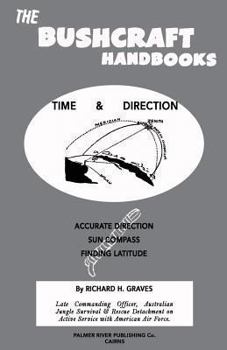The Bushcraft Handbooks - Time & Direction
"The Bushcraft Handbooks" were first published in Australia in 1952. Based on the Author's wartime service in Australia and New Guinea teaching "Junglecraft" to Australian and American forces, they are distilled, concentrated old-time bushcraft knowledge, presented in a very easy to assimilate format. For those who remember them, the Bushcraft Handbooks are also a heavy hit of nostalgia.
Rather than publish all of the volumes under the one cover, the Author originally chose to publish each aspect of bushcraft in its own individual handbook. His rationale was that the reader was more inclined to take a 50 page handbook with him into the wilds than a 400 page book. The former can be easily slipped into a pocket or daypack, while the latter cannot. The Bushcraft Handbooks are useless unless the reader practices the skills the books were designed to impart. The individual handbooks format was chosen to support that end.
Out of print for decades, and in keeping with the Author's wishes, this series of Bushcraft Handbooks are reproduced as close to their original format as possible. The series comprises the following volumes:
Bush Ropemaking, Bush Hutmaking, Traps & Snares, Bush Campcraft, Time & Direction, Travel & Gear, Food & Water in the Bush, Firemaking & Lighting, Trapping & Tracks, Knots & Lashings.From the introduction to "Time & Direction"
Obtaining time and direction without equipment is practical, and in general can be more accurate than the average person's watch or compass.
Both words, "time" and "direction", are inter-related because if one has accurate time, accurate direction is obtained in a matter of seconds, or if one has accurate direction (from north) then accurate time is immediately practical without a watch.
The subject of navigation has been surrounded by many technical words, necessary to the science, but in this work the author has attempted to simplify the whole subject, and endeavoured to avoid words which would have no meaning to the average reader."





